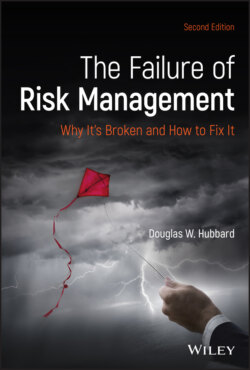Читать книгу The Failure of Risk Management - Douglas W. Hubbard - Страница 46
На сайте Литреса книга снята с продажи.
NOTES
Оглавление1 1. Some of the details of this are modified to protect the confidentiality of the firm that presented the method in this closed session, but the basic approach used was still a subjective weighted score.
2 2. C. Tsai, J. Klayman, and R. Hastie, “Effects of Amount of Information on Judgment Accuracy and Confidence,” Organizational Behavior and Human Decision Processes 107, no. 2 (2008): 97–105.
3 3. C. Heath and R. Gonzalez, “Interaction with Others Increases Decision Confidence but Not Decision Quality: Evidence against Information Collection Views of Interactive Decision Making,” Organizational Behavior and Human Decision Processes 61, no. 3 (1995): 305–26.
4 4. Stuart Oskamp, “Overconfidence in Case-Study Judgments,” Journal of Consulting Psychology 29, no. 3 (1965): 261–65, doi: 10.1037/ h0022125. Reprinted in Judgment under Uncertainty: Heuristics and Biases, ed. Daniel Kahneman, Paul Slovic, and Amos Tversky (Cambridge, UK: Cambridge University Press, 1982).
5 5. P. Andreassen, “Judgmental Extrapolation and Market Overreaction: On the Use and Disuse of News,” Journal of Behavioral Decision Making 3, no. 3 (July–September 1990): 153–74.
6 6. D. A. Seaver, “Assessing Probability with Multiple Individuals: Group Interaction versus Mathematical Aggregation,” Report No. 78–3 (Los Angeles: Social Science Research Institute, University of Southern California, 1978).
7 7. S. Kassin and C. Fong, “I'm Innocent! Effects of Training on Judgments of Truth and Deception in the Interrogation Room,” Law and Human Behavior 23 (1999): 499–516.
8 8. D. Kahneman and G. Klein, “Conditions for Intuitive Expertise: A Failure to Disagree,” American Psychologist (September 2009): 515–26.
9 9. “It's Academic,” Stanford GSB Reporter (April 24, 2000): 14–15.
10 10. E. Zuckerman and J. Jost, “What Makes You Think You're So Popular? Self-Evaluation Maintenance and the Subjective Side of the ‘Friendship Paradox,’” Social Psychology Quarterly 64, no. 3 (2001): 207–23.
11 11. D. M. Messick, S. Bloom, J. P. Boldizar, and C. D. Samuelson, “Why We Are Fairer Than Others,” Journal of Experimental Social Psychology 21 (1985): 480–500.
12 12. N. D. Weinstein, “Unrealistic Optimism about Future Life Events,” Journal of Personality and Social Psychology 39 (1980): 806–20.
13 13. O. Svenson, “Are We All Less Risky and More Skillful Than Our Fellow Drivers?” Acta Psychologica 47 (1981): 143–48.
14 14. D. Dunning and J. Kruger, “Unskilled and Unaware of It: How Difficulties in Recognizing One's Own Incompetence Lead to Inflated Self-Assessments,” Journal of Personality and Social Psychology 77, no. 6 (1999): 121–34.
15 15. N. Nohria, W. Joyce, and B. Roberson, “What Really Works,” Harvard Business Review (July 2003).
16 16. H. Bühlmann, “The Actuary: The Role and Limitations of the Profession since the Mid-19th Century,” ASTIN Bulletin 27, no. 2 (November 1997): 165–71.
